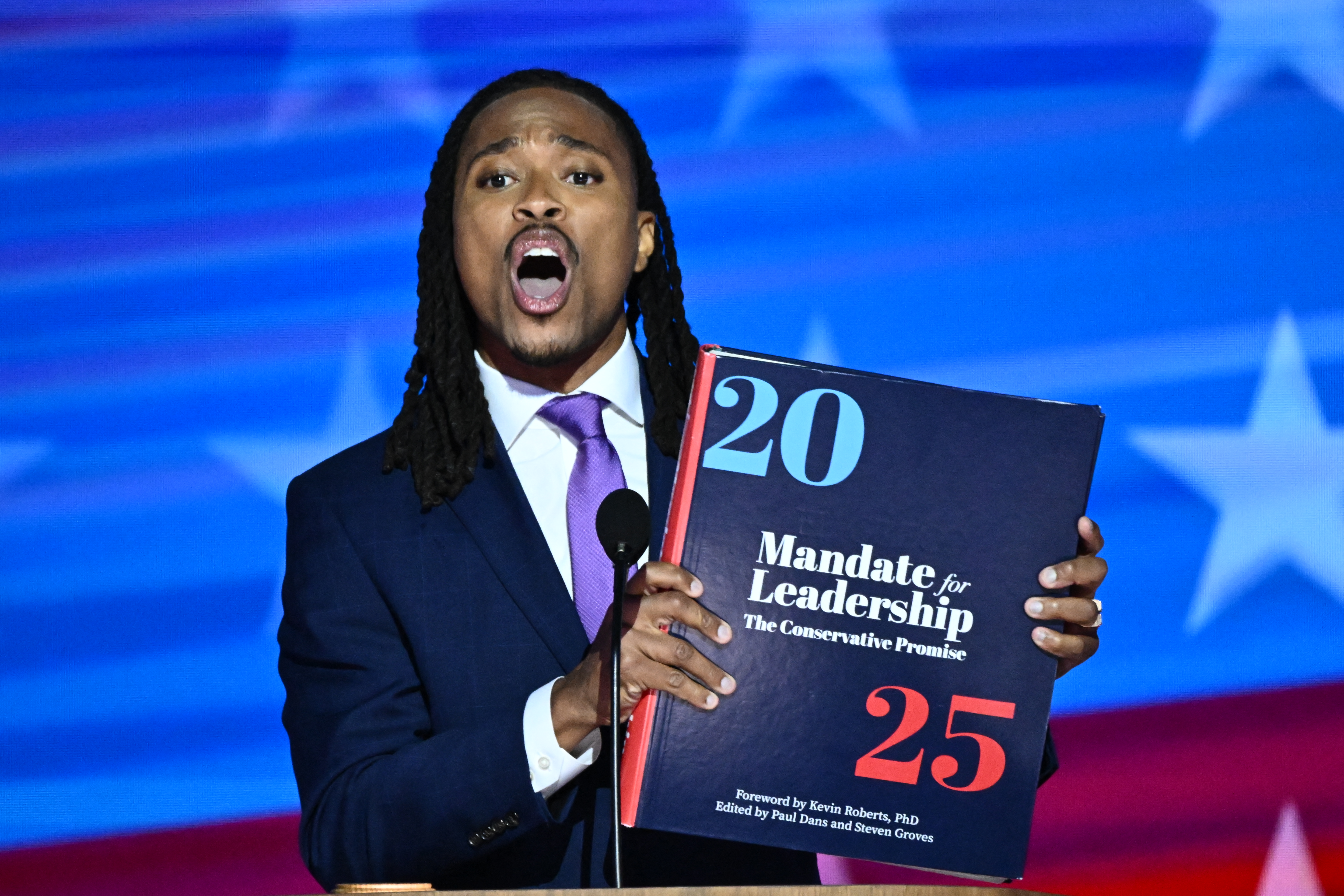A Glimpse Into Your Project 2025 Future
The controversial conservative agenda received plenty of airtime during election season. But what would happen if it came to pass?

Throughout this election season, Project 2025 was referenced over and over by Democrats and Republicans alike. During the presidential debate in September, Kamala Harris called it a "detailed and dangerous plan" that former President Trump would implement if he were elected again. Trump denied any involvement with it, saying “I haven’t read it. I don’t want to read it, purposely.” Since then, he has continued to try to distance himself from the conservative initiative.
With all the rhetoric surrounding Project 2025, it’s been difficult to understand what it actually is. In a nutshell, Project 2025 is a multi-pronged plan that aims to influence the next Republican president (aka, Trump). Per its website, it has four parts: a policy agenda for the new president, a database of people who could serve in his administration, a training for those people called the “Presidential Administration Academy,” and a playbook of recommended actions to be taken within the first 180 days of the administration.
The aspect of Project 2025 that’s received the most attention is the first part—the 920-page policy book that calls for a sweeping overhaul of the federal government. “Essentially, it’s a playbook for bureaucrats and politicians to take over all kinds of aspects of our lives and to manipulate the federal government to serve their political ends,” says Mike Zamore, National Director of Policy and Government Affairs at the American Civil Liberties Union (ACLU). “It goes through department by department and agency by agency with specific plans to dramatically remake how the federal government works and who it works for.”
Written by veterans of Trump’s first administration, Project 2025 is led by The Heritage Foundation, a conservative think tank whose goal is to “formulate and promote conservative public policies,” according to their website. The group has been devoted to promoting a conservative vision of America—and influencing Republican presidents—since it released its first “Mandate for Leadership” at the beginning of Ronald Reagan’s presidency in 1981. (It has since released a new “Mandate for Leadership” every four years.)
But just how influential are their recommendations? According to The Heritage Foundation, during the first year of Trump’s first term, he “embraced” nearly two-thirds of their policy mandates. The website states that “64 percent of the policy prescriptions were included in Trump’s budget, implemented through regulatory guidance, or under consideration for action.” These included leaving the Paris Climate Accords, increasing off-shore drilling and military spending, and repealing net neutrality.

At the Democratic National Convention in August, multiple speakers invoked Project 2025, including Pennsylvania State Representative Malcolm Kenyatta.
It remains to be seen just how much of Project 2025 will be enacted once Trump takes office, but there’s no doubt that everything from LGBTQ+ and abortion rights to immigration and climate justice are at risk. Below, what Project 2025 lays out for several top issues.
LGBTQ+ Rights
“The Project 2025 agenda is to deny the existence and take away the identity of LGBTQ+ individuals, and trans individuals in particular,” says Zamore. Indeed, the policy guide laments the “toxic normalization of transgenderism,” and equates “transgender ideology” to pornography. The authors write that families are made up of “a married mother, father, and their children,” and policies that ensure LGBTQ+ equity should be “repealed and replaced by policies that support the formation of stable, married, nuclear families.”
Stay In The Know
Get exclusive access to fashion and beauty trends, hot-off-the-press celebrity news, and more.
Project 2025 also takes aim at many hard-won LGBTQ+ protections. The plan calls for removing terms like "sexual orientation" and "gender identity" from federal regulations and laws, which would allow legal discrimination against those who identify as LGBTQ+. It also seeks to roll back anti-discrimination protections, such as the Supreme Court's decision in Bostock vs. Clayton County, which provides protection against employment discrimination based on sexual orientation or gender identity. It also states that transgender people should be banned from serving in the military, a policy that Trump enacted during his first term and that Biden reversed.
Reproductive Rights
Project 2025 aims to severely restrict abortion access nationwide. (It even recommends changing the name of the Department of Health and Human Services to the Department of Life.) The initiative calls for the reversal of the FDA’s approval of mifepristone, a drug that’s widely used for medication abortion and miscarriage management. It also seeks to reinstate stricter rules for using the drug and require that it be given in person (instead of by mail). And speaking of the mail, Project 2025 also wants the Justice Department to begin enforcing the Comstock Act, a law from 1873 that prohibits “obscene” materials, like pornography, contraceptives, or any drugs or devices used for abortions, from being sent through the mail.

The Heritage Foundation headquarters in Washington, D.C.
The authors of Project 2025 also want to increase data collection on people who have abortions. They write: “Because liberal states have now become sanctuaries for abortion tourism, HHS should use every available tool, including the cutting of funds, to ensure that every state reports exactly how many abortions take place within its borders, at what gestational age of the child, for what reason, the mother’s state of residence, and by what method.”
Zamore says the ACLU is worried about the new administration’s data-collecting methods. “We’re concerned about surveillance-based tactics that could be used to see where people’s phones have gone, like if your phone has gone across state lines to an abortion clinic,” he says. “Or if you’ve been providing healthcare via telemedicine, could you be targeted? These are very real concerns in this environment.”
Immigration
Trump largely campaigned on a promise of mass deportation of illegal immigrants—an idea that the Project 2025 agenda fully supports. The authors encourage the next administration to finish the wall along the Mexican border and take a “creative and aggressive approach to tackling dangerous criminal organizations at the border.” (They call Mexico a “failed state run by drug cartels.”) To assist with arrests along the border, the authors recommend using active-duty military personnel and the National Guard—an approach that has never been utilized.
“They envision a huge, militarized dragnet of our communities, one that will target families,” says Zamore. “There are millions of mixed-status families in this country where, for example, the kids are citizens but the parents are not. It could really tear families apart.” There is also a concern that Immigration and Customs Enforcement (ICE) could stake out schools, playgrounds and churches, as Project 2025 suggests rolling back a mandate that prohibited ICE from enforcement in such “sensitive zones.”
Climate Change
Project 2025 would undo many of the environmental advances made by the Biden administration. “It provides a framework for bolstering fossil fuels, ending any U.S. leadership in climate change issues globally, and repealing many of the advances in the Bipartisan Infrastructure Law (BIL) and the Inflation Reduction Act (IRA),” says Emily Hammond, a professor of law and director of the Academic Sustainability Programs at The George Washington University in Washington, D.C. “Plus, it would push for taking away the EPA's authority to regulate greenhouse gases under the Clean Air Act.”

Of Project 2025, Kamala Harris asserted that Trump's "DNA is all over it."
The conservative agenda also calls for the National Oceanic and Atmospheric Administration (NOAA) to be broken up and downsized. The NOAA has six offices, including the National Weather Service, the National Ocean Service, and the National Marine Fisheries Service. The authors of Project 2025 write that “these form a colossal operation that has become one of the main drivers of the climate change alarm industry and, as such, is harmful to future U.S. prosperity.”
Diversity and Inclusion
In every section of the Project 2025 policy guide, the authors recommend eliminating diversity, equity and inclusion (DEI) programs across the federal government. They also reject critical race theory, writing that “when critical race theory is used as part of school activities such as mandatory affinity groups, teacher training programs in which educators are required to confess their privilege, or school assignments in which students must defend the false idea that America is systemically racist, the theory is actively disrupting the values that hold communities together such as equality under the law and colorblindness.”
Zamore says the authors are trying to rewrite history—literally, in some cases—so that history textbooks “don’t tell the full story of our country and don’t make certain people uncomfortable.”
In several instances, the agenda also recommends that federal employees who "engage in ideological agitation on behalf of the DEI agenda" be terminated.
Gun Access
Project 2025 doesn’t lay out any specific policies on gun control. Still, given its conservative positioning, it’s safe to assume the authors would embrace the gun lobby’s agenda, including weakening concealed carry laws and overturning state bans on assault weapons.
Abigail Libers is an award-winning journalist based in New York. Her work as been featured in New York magazine, Scientific American, SELF, Glamour, Marie Claire, Elle, and others.
-
 7 Controversial Summer Trends Leading the Pack
7 Controversial Summer Trends Leading the PackI'm obsessed.
-
 Kaia Gerber Just Overhauled Her Signature Capsule Wardrobe
Kaia Gerber Just Overhauled Her Signature Capsule WardrobeBallet flats are gone.
-
 Princess Lilibet Has Prince Harry's Eyes in Adorable New Fourth Birthday Photos
Princess Lilibet Has Prince Harry's Eyes in Adorable New Fourth Birthday PhotosProud mom Meghan shared some unseen photos of Lili—and she looks just like her dad.